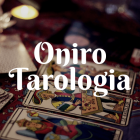The dream of Gilgamesh
The famous dreams of literature can offer the inspiration for interesting exercises of OniroTarology, trying to find out the meaning of a dream with the symbolism of the Tarot. In this exercise we address the “Dream of Gilgamesh”, narrated in the ancient “Epic of Gilgamesh“.
I also use this example to show in practice how the OniroTarology method works.
Description of the dream of Gilgamesh
Gilgamesh got up and revealed the dream, saying to his mother:
“Mother, I had a dream last night.
Stars of the sky appeared,
and some kind of meteorite(?) of Anu fell next to me.
I tried to lift it but it was too mighty for me,
I tried to turn it over but I could not budge it.
Land of Uruk was standing around it,
and the whole land had assembled about it,
the populace was thronging around it,
the Men clustered about it,
and kissed its feet as if it were a little baby (!).
I loved it and embraced it as a wife.
I laid it down at your feet,
and you made it compete with me.”
OniroTarology example applied to the dream of Gilgamesh
In applying the OniroTarology method, we first of all make a selection of the most evocative Major Arcana relating to the dream. It is a step to be done together with the dreamer (or ourselves, if the dream is ours!), but in this specific case it is quite difficult to interact with the good old Gilgamesh, who died about 4,500 years ago … if he were a real character!
So let’s proceed analyzing the objective elements of the dream and find some interesting Tarot cards to translate them.
The star. It is the Arcanum that immediately catches the eye: the stars appear literally in the dream. It is a Tarot that speaks of predestination, according to the ancient conception that each of us is born under a particular star (or “natal chart”, we would say today).
In Arcanum XVII shines among others a bigger star: it is our personal destiny, the Self, in Jungian terms. We can sense that the personal destiny of Gilgamesh would have been quite heavy to bear!

Marie-Louise von Franz once told about a youth’s dream of Marilyn Monroe surprisingly similar to that of Gilgamesh: great characters, as well as the “Stars” of cinema, are often crushed under the weight of their destiny.
The dream of Gilgamesh and the Tower Tarot card
The Tower could represent the upheaval of Gilgamesh in the relationship with his cumbersome alter ego. From the Tower struck by lightning (or rather from the falling star in this dream) two subjects emerge: Gilgamesh and his double, his Shadow (in the rest of the Epic, Enkidu will embody this role).
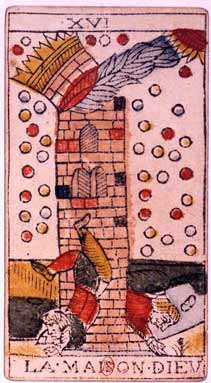
The Lovers Tarot card could instead represent the attitude of Gilgamesh towards the creature who have fallen from space. Gilgamesh loves and embraces Enkidu, introducing him to his mother (the elderly woman of Arcanum VI), struck by the arrow of Cupid, as a manifestation of the Self or personal destiny.
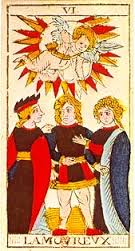
World Tarot card may represent the people from all over the world who come to worship the new creature.
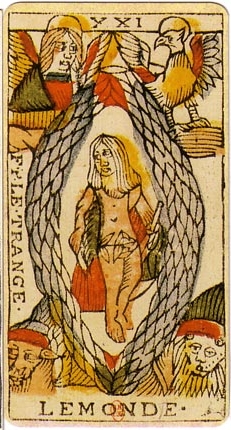
In the center we can see an androgynous creature. It symbolizes the fusion of Gilgamesh and its double, of a feminine nature (in the dream he is loved “as a wife”). Around it the four elements are gathered, recalling the 4 of the Emperor: it is the old system of power, the status quo, the old “Ego” of Gilgamesh that bows before the new.
Final choice: Tarot selected to interpret Gilgamesh’s dream
We have selected the most representative Major Arcana relating to this dream and now we proceed to construct the OniroTarology spread: the Tarot cards are placed side by side and we observe the dynamic that triggers.
In this phase we aim to simplify, trying to minimize the Tarot cards chosen initially: we keep the Star and the Tower because they condense the largest number of symbolic themes inspired by the dream of Gilgamesh.
The World Tarot card can remain in the background, possibly indicating the final psychic development of Gilgamesh: the dream, however, stresses the conflicting relationship with the double (“it falls on me”; “it is too heavy for me”), far from harmonious completeness of the World.
We also discard The Lovers Tarot card: the arrow shot by Cupid is equivalent to the symbol of the lightning that destroys the Tower, while the mother’s theme is already present through the woman of the Star (click here to know more about the Star symbolism!).
OniroTarology spread for the dream
We have the Star and the Tower under our eyes, which happen to be numerically close together: XVI and XVII. How do we arrange them to analyze the dream?
In my method, if the dream has a positive development, the Tarot is ordered from the lowest to the highest. The thermometer to measure the positive or negative development of the dream is the mood of the dreamer upon awakening: if he experiences anxiety, sadness or fear we can associate a negative development. Again, we can’t interview Gilgamesh about his feelings, but from the description of the dream, which ends with a bucolic and harmonious image, we can deduce that when he awoke he experienced a certain euphoria.
We then arrange the Tarot cards in the ordered sequence XVI – XVII:
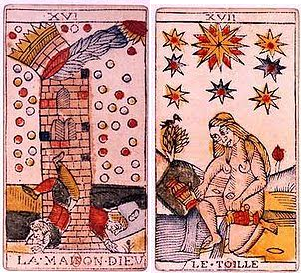
Interpretation of the dream
We are now ready to formulate our interpretation of the dream according to the Tarot language:
- A star falls from the sky, destroying the status quo of Gilgamesh: he is no longer the master in command of his own psychic construction and he must confront Enkidu, his Shadow.
- Once the initial loss is overcome, Gilgamesh will draw on his own maternal energy to harmonize the opposites: the liquids of the two vessels, initially separated, are poured into a new vital flow, under the sparkle of the great Star that represents the Self / destiny of Gilgamesh.
Hope you liked this and see you soon for another OniroTarology exercise! 🙂
